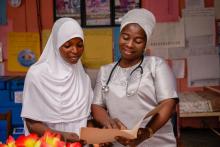Celebrating the Nigerian woman - the epitome of courage, strength and hope
Abuja, 12 March, 2020 - While celebrating women this week, the UN Women Representative in Nigeria Ms Comfort Lamptey defined the Nigerian woman as “a symbol representing – courage, strength, resilience, hope, tenacity and transformational power.”
In a world that’s moving towards a kinder, better and more equal future, evidence shows there’s still progress to be made to empower women. The global theme for the celebration, I am Generation Equality: Realizing Women’s Rights is about building an inter-generational movement to advance women’s rights and gender equality. It is also about inclusivity and participation, as the gains of gender equality are not just for women and girls, but for everyone who will benefit from a more gender-equal world.
Ms Lamptey further stated “My call to everyone is to take the stance which future generations will benefit from, to stand up for the inclusivity and participation of women, to mobilize for gender equality. Be Generation Equality.”
Nigerian women asses the journey so far
Despite the progress made by WHO and other UN Agencies in ensuring gender equality across the globe, obstacles like early marriage, illiteracy, and lack of equal rights in high level decision making still stand in Nigerian women’s way.
The national average for female literacy in Nigeria was 61.4%. We have made progress with the enactment of the Violence Against Persons Prohibition Act and with the establishment of the National Gender Policy. Nigeria currently needs more gender parity legislation to protect women and girls from sexual harassment in all spaces, afford women the rights to own property and prohibit early marriage.
Women, who make over 49% of Nigeria’s population have suffered gender inequality in access to health services. Nearly 20% of all global maternal deaths occur in Nigeria. Nigeria has about 512 deaths per 100,000 live births. Many women who give birth do not receive assistance from a skilled provider, and poor women in remote areas are the least likely to receive adequate healthcare. Nigeria also has the largest number of child marriage in Africa and one of the highest prevalence rates in the world. The representation of women in politics and decision-making remains unacceptably low in Nigeria, with women currently constituting under five percent of elected political leaders.
As for Kori Habib, a Media and communication specialist for United Nations Population Fund (UNFPA), more work needs to be done in ensuring gender equality in Nigeria. She stated that “2020 is the year for accelerating the ICPD 25 commitments which Nigeria is a signatory, it is also the year in stock taking the Beijing +25 platform of action and the Oslo agreement- looking at the 2030 UN agenda of reform that talks on 50-50 for male and female staffing within the system.”
“We must carry along the youths both male and female to be our next voice for the generational change for better gender equality.”
Gender inequality is a crosscutting determinant of health that operates in conjunction with other forms of discrimination based on such factors as age, socio-economic status, ethnicity or place of origin and sexual orientation. Interventions to address gender inequality also provides a platform for addressing other forms of health-related discrimination
“In addressing these key determinants that have affected gender equality for decades such as social, cultural, economic and political barriers, a boarder multi sector approach need to implemented for effective impact.” Said Dr Joy Ufere, Cluster Lead, Family and Reproductive Health Cluster WHO.
Driving the levers of change
WHO has been working with the Federal Ministry of Health (FMoH) to build the capacity of health managers and ensure they are equipped with the skills to address gender-based health inequities in their work using specific strategies.
WHO through its programs and interventions ensure issues of gender inequality are addressed, “our programs are targeted at ensuring we give voice to women and ensuring equitable access to quality health services and interventions.” Stated Dr Fiona Braka, WHO Nigeria Officer in Charge (OiC). This is demonstrated in WHO’s support to FMoH to develop a training manual for health managers to mainstream gender in health and in development of a National policy on Gender in Health.
In terms of reaching the most vulnerable and ensuring women have equitable access to healthcare, WHO is presently providing healthcare services in the North East Nigeria through hard to reach mobile teams who provide essential lifesaving health services to the people especially women and children. WHO with funding from the Government of Canada has supported Health training institutions in Bauchi and Cross River States to train and produce more female health workers to provide quality health services to the people of the states.
WHO continues to provide technical support to Government to ensure issues that fuel gender inequality including poverty do not become a barrier to access to healthcare through health finance interventions.
Technical Contacts
Dr Joy Ufere; Email: uferej [at] who.int (uferej[at]who[dot]int); Tel: +234 706 625 4989
Dr Muyiwa Ojo; Email: ojool [at] who.int (ojool[at]who[dot]int); Tel: +234 803 979 5143



